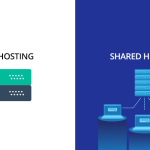In today’s digital age, having an online presence is essential for businesses, entrepreneurs, and even individuals who want to share their ideas with the world. Whether you’re planning to start a blog, an e-commerce store, or a professional website, understanding the basics of domain and hosting is the first step. In this blog, we’ll break down what domain and hosting are, how they work together, and why they are crucial for your online success.
What is a Domain?
A domain is essentially the address of your website on the internet. When users want to visit your website, they type your domain name into their web browser’s address bar, and it directs them to your site. Think of a domain as your online "street address" that helps people find you.
Components of a Domain Name
A domain name is made up of two main parts:
- Second-Level Domain (SLD): This is the name you choose for your website. For example, in
example.com, "example" is the second-level domain. - Top-Level Domain (TLD): This is the suffix or extension at the end of your domain name, such as
.com, .org, .net, .edu, etc. The TLD helps categorize the domain. For instance, .com is commonly used for commercial websites, while .org is typically used by non-profit organizations.
Together, the SLD and TLD make up a fully qualified domain name (FQDN), like example.com.
How to Choose a Domain Name
Choosing the right domain name is crucial for your website’s identity and branding. Here are a few tips for selecting a good domain name:
- Keep it short and memorable: A short and easy-to-remember domain name helps visitors find and return to your site.
- Avoid numbers and hyphens: These can confuse users and make it harder for them to remember your domain.
- Choose a relevant TLD: While
.com is the most popular, consider other TLDs if they better fit your brand or industry.
Once you’ve chosen a domain name, you need to register it with a domain registrar, which ensures that you own the domain and can use it for your website.
What is Hosting?
While the domain name is the address of your website, hosting is where your website "lives." Web hosting refers to the service that stores your website’s files, such as HTML, images, videos, and other content, on a server. This server is connected to the internet, allowing users to access your website from anywhere in the world.
Types of Web Hosting
There are several types of web hosting, each with its own features and benefits:
- Shared Hosting: In shared hosting, multiple websites share the same server resources (CPU, RAM, etc.). This is the most affordable option, making it ideal for beginners or small websites with low traffic. However, performance can be affected if other sites on the server experience high traffic.
- VPS Hosting: Virtual Private Server (VPS) hosting offers more resources and control than shared hosting. While multiple websites still share the same physical server, each site has its own allocated resources, leading to better performance and stability. VPS hosting is a good choice for growing websites that need more power.
- Dedicated Hosting: With dedicated hosting, you have an entire server dedicated to your website. This option provides the highest level of performance, control, and security, making it ideal for large websites with high traffic. However, it’s also the most expensive type of hosting.
- Cloud Hosting: Cloud hosting uses a network of servers to host your website, ensuring high availability and scalability. If one server fails, another one takes over, minimizing downtime. This type of hosting is great for websites with variable traffic, as you can easily scale resources up or down as needed.
- Managed Hosting: In managed hosting, the hosting provider takes care of server management tasks like updates, security, and backups. This allows you to focus on your website’s content and business operations, rather than server maintenance.
How to Choose the Right Hosting
Selecting the right hosting depends on your website’s needs:
- Traffic: If you expect high traffic, consider VPS, dedicated, or cloud hosting.
- Budget: Shared hosting is the most budget-friendly, while dedicated hosting is more costly but offers better performance.
- Technical Expertise: Managed hosting is a good option if you prefer to leave server management to professionals.
How Domain and Hosting Work Together
To have a functional website, you need both a domain name and web hosting. Here’s how they work together:
- Register Your Domain: First, you choose and register a domain name through a domain registrar.
- Choose a Hosting Plan: Next, you select a web hosting plan based on your website’s needs and budget.
- Connect Domain to Hosting: After setting up your hosting account, you need to point your domain to your hosting provider’s servers. This is usually done by updating the domain’s DNS (Domain Name System) settings, which tell the internet where to find your website’s files.
- Upload Your Website: Once your domain and hosting are connected, you can upload your website’s files to the hosting server, making your site accessible to the world.
Conclusion
Understanding the basics of domain and hosting is the foundation of building a successful online presence. A domain name serves as your website’s address, helping users find you on the internet, while hosting is where your website’s content is stored and delivered to visitors. Together, they make your website accessible to the world. Whether you’re starting a personal blog, launching an e-commerce store, or creating a professional website, choosing the right domain name and hosting plan is crucial for your online success.







